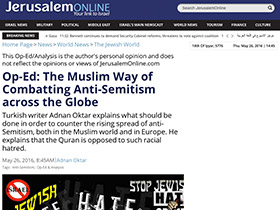
Diversity is good. It is a barrier to the dullness that constantly seeks a way to creep into our lives. Differences in the faces we see around us, the voices we hear, or the food we enjoy is a delightful part of our lives that we cannot even imagine living without.
Regrettably, there are times when differences become a barrier and an excuse for some groups of people to engage in hostile behavior towards others. Such behaviors are usually stemming from ignorance or a lack of knowledge. In our present world today, these forms of behavior can be clearly observed in the form of anti-Semitism, racism, xenophobia, and Islamophobia.
These are shameful and embarrassing facts in human history that we cannot easily erase. Many groups have been targeted as a result of this unacceptable outlook and Jews, undoubtedly, have been on the receiving end of what has been probably the longest and most-persistent hostility any group has ever seen in the world.
Anti-Semitism is blatant racism and its foundation is not supported or legitimized through any religious teachings or philosophy. From the time of the pharaohs to the Middle Ages and from the Holocaust to our modern era, this ludicrous type of hatred has never failed to concoct the most absurd fantasies; blood libels, the supposed Jewish control over world economies, and the so-called Jewish conspiracies. Today, it is still alive and dangerous, threatening our world and its very civilization.
As irrational as it is, it is a reality and it is fed not only by deep-running social prejudices but also by gross misinterpretations of both Christianity and Islam. Europe, which never had a good historical record regarding Jewish minorities, seems to be repeating its past mistakes; adding to that is the growing anti-Semitic feelings in Muslim communities of Europe and the situation becomes even more dangerous. Hate speech, threats, and violent attacks occur on almost a daily basis and instill feelings of insecurity in the minds of the Jewish citizens in their countries, ultimately leaving them no choice other than to look for a new home.
However, the problem is worse in the Middle East and the larger Islamic world, magnified by the current Israeli-Palestinian conflict. There was prejudice and discrimination against Jews, even preceding the Israeli/Palestinian issue when Jews were a peaceful part of the social fabric in many Arab countries. Following the foundation of the State of Israel, as the Arab-Israeli conflict started, it became a dangerous place for Jews. Consequently, close to one million Jews were forced to leave their homelands, their properties were confiscated, and those who chose to stay had to endure fierce hostility.
Mass propaganda, misinterpretation of Islam, reference to non-Islamic superstitions and a good many hateful fatwas (Islamic rulings) exacerbate the problem. Some Palestinian children are being inexplicably taught to hate Jews and even encouraged to attack them at the first opportunity they get. Even worse, certain circles have their own agenda in stirring anti-Semitism and do not hesitate to use the name of Islam to this end. Regrettably, they succeed most of the time due to a general lack of knowledge prevalent among the majority of the Muslim population about what constitutes true Islam. Today, this unacceptable sentiment has morphed into a vicious, vile and evil act that causes innocent Jews to be stabbed randomly on the streets, deeply disturbing the Muslims of the world.
However, Muslims wrongly affected by this form of racism should know that such an attitude is a direct violation of the Qur'an. First of all, God explains that the reason we are created as different nations and tribes is so that we can meet and come to know each other (13:49), and to do good deeds (2:148). Furthermore, God commands Muslims to love, respect and peacefully co-exist with Jews and Christians (5:5, 29:46).
Therefore a Qur'an-abiding Muslim can never accept anti-Semitism. Muslims that have made this mistake up to this point should abandon this poisonous ideology, understand well the words of the Prophet Mohammed and not rely on the superstitions which have been wrongly attributed to him. They should also learn how beautifully the Prophet Mohammed showed respect and compassion to both Jews and Christians in line with the Qur'an.
Muslim communities should denounce such hatred in every opportunity and explain that anti-Jewish sentiment is a product of superstitious and radical thinking. They should also declare, with evidence from the Qur'an, that such hatred has no place in the Qur'an.
However, this problem definitely isn’t a Muslim concern only. Today, anti-Semitism can be seen in all cultures as close to one billion people around the world are thought to have negative feelings about Jews. This shocking sentiment is felt in Europe, as well. The EU’s Fundamental Rights Agency reported that in 2013, one- third of European Jews refrained from wearing religious garb out of fear. This fear is a contributing factor to the constantly declining Jewish population in Europe. For instance, 3.2 million Jews lived in Europe in 1960; today, the number is down to 1.4 million. France, Italy, Belgium and Britain saw the greatest numbers of Jewish migration to Israel, up by 88 percent in 2014.
Measures to stem anti-Semitism are all necessary, including new laws, stricter penalties and extra security for Jews and their places of worship. However, without getting to the root of the problem, such methods are unlikely to be effective in the long term. To this end, it is crucial to eliminate the mistaken and distorted beliefs that foster hatred and purge educational systems, customs and traditions of this rhetoric. Societies should take action to address such wrong beliefs which feed anti-Semitism and keep new generations away from them.
It is important that world leaders understand the severity of the problem and work jointly to tackle it. Today, almost every society in the world needs to make a comprehensive educational leap to address the hate culture. Otherwise, the problem will be even worse for the future generations. Educational programs to foster understanding and respect for each other, measures to end hate indoctrination and deep-running prejudices will definitely be more effective in building a better world.
Adnan Oktar's piece in Jerusalem Online & Channel 9:
http://9tv.co.il/news/2016/09/27/232134.html



